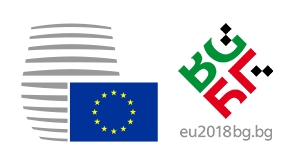Editor's note
International Internet Magazine. Baltic States news & analytics
Saturday, 20.04.2024, 06:49
Bulgarian Presidency in the Council: “United stand we strong”
 Print version
Print version |
|---|
The Minister in
charge of the Bulgarian Presidency, Lilyana Pavlova, has said that
preserving and strengthening unity and solidarity among the member states will
be key Presidency’s priority: hence the country's Presidency motto:
"United We Stand Strong".
Estonia’s good example
Estonian Presidency’s term in the Council of the European Union (during the second half of 2017) has made a good deal of work showing Bulgaria the optimal delivery during the helm of the Council. During its Presidency, Estonia initiated 377 different initiatives, organised 275 thematic events in Tallinn, chaired more than 1 200 working groups in Brussels and held 31 Council meetings. The major event of the Estonian Presidency was the Tallinn Digital Summit, where the EU leaders and heads of the member states discussed the ways to ensure European competitiveness in modern rapid technological/digital revolution.
Due to Estonia’s work, the EU is more united and better prepared to tackle both digital and
climate change issues. Significant progress made on digital aspects, for
example, on agreements on the free movement of data, the development of the 5G
network, and the single digital gateway to
develop e-Government on the EU level.
The Presidency
brought 27 000 visitors to Estonia: they enjoyed modern Estonian cuisine
and Tallinn Creative Hub (Kultuurikatel). The Presidency has brought Estonia
closer to all member states and the EU closer to Estonians, said Piret Lilleväli,
head of the organising team of the Estonian Presidency.
“The Presidency”: guiding EU’s role
The General Secretariat of the Council (GSC) is the body of staff responsible for assisting two “Councils”: - the European Council (summits of the EU head of states) and the Council of the EU (or the Council of the EU member states’ ministers), including States’ presidencies, the Permanent Representatives Committee (Coreper) and the other Council committees and working parties. The GSC helps organise and ensure the coherence of the Council's work and the implementation of its 18-month programme. It assists the European Council and its President and also supports the Council presidency in negotiations within the Council and with the other EU institutions.
The main tasks of the GSC are:
·
to assist, advise
and help coordinate the work of the Council and the European Council,
including the implementation of the Council's 18-month programme;
·
to support the
Council presidency in negotiations within the Council and with other EU
institutions; and
·
to provide logistical
support and handle the practical organisation of meetings (including
meeting rooms, document production and translation).
Source: http://www.consilium.europa.eu/en/general-secretariat/
Rotating Presidency
The presidency of the Council rotates among the EU member states every 6 months. During this 6-month period, the presidency chairs meetings at every level in the Council, helping to ensure the continuity of the EU's work in the Council.
Member states holding the presidency work together closely in groups of three, called 'trios'. This system was introduced by the Lisbon Treaty in 2009. The trio sets long-term goals and prepares a common agenda determining the topics and major issues that will be addressed by the Council over an 18 month period. On the basis of this programme, each of the three countries prepares its own more detailed 6-month programme.
The current trio is made up of the presidencies of Estonia, Bulgaria and Austria.
Bulgarian priorities
Bulgaria has been
preparing for the Presidency since the last year: thus in last November at the briefing
in Brussels, Monika Panayatova, Deputy Minister for the
Bulgarian Presidency of the Council set out some priorities of the Bulgarian
Presidency. She said, for example, that strengthening unity and solidarity
among the member states will be the key priority: hence, the country’s
presidency motto: "United We Stand Strong".
During the Presidency, Bulgaria will focus on four key areas: a) future of
Europe and young people, b) Western Balkans, c) security and stability, and d) digital
economy.
http://www.consilium.europa.eu/en/council-eu/presidency-council-eu/
In concrete terms,
the Bulgarian Presidency aims at delivering on the following priorities:
- concentrating on
issues related to the discussions on the Future of Europe,
- on economic
growth and social cohesion,
- on closer
connections within the Western Balkans’ region,
- on the European security
perspectives,
- on stability in
stronger and united Europe,
- on the digital
economy and skills for the future, and
- on focusing on youth
problems in Europe.
Presidency’s
priorities can be seen at:
http://www.consilium.europa.eu/media/32357/programme_bg_presidency_2018_en.pdf
Bulgarian
government has inherited many complex dossiers from the previous Estonian
Presidency in the Council of Ministers. However, the government is optimistic
to “have a say” in resolving modern European challenges. According to the
Eurostat pulls, the European Union is experiencing a new sense of optimism;
many EU leaders aspire to exploit the current window of opportunity to push
European cooperation forward.
The Baltic Course
wishes Bulgarian Government success and optimism in fulfilling ambitious
Presidency’s priorities.











